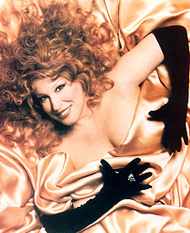| November 17, 1998 |
 |
|
by Eric Diesel, Curtis Waterbury, & Lissa Townsend Rodgers |
| |
 Bette Midler
Bette Midler
"Bathhouse Betty"
(Warner Brothers)
There are those who say that Bette Midler's greatest strength
as a singer is her talent as an actress. And they think it's
a dis. A great pop singer's voice conveys not only musical
notes but experience, and in that arena Bette is unparalleled,
inhabiting a song's atmosphere with a powerful alto honed
by fifty-plus years of survival. The Divine Miss M's new release,
"Bathhouse Betty," exploits that ideal to its fullest, offering
a buffet of musical treats that, if slightly uneven, never
veer into vulgar formula.
Like Patti LaBelle, Midler's material can never quite
contain her voice; her vocal posturing is by turns tawdry,
seductive, heartbreaking, sassy, ruthless—and even
tuneful—but always transcendent. She is one of the
few singers who can overcome bad material and vault cheesiness
into the stratosphere of Art-with-a-capital-A, carrying
every effect in her larynx from beyond-the-grave whisper
to ten-alarm fire.
She devastates the simple harmonics of "Lullaby in Blue,"
trading not on the maudlin notes of a mother mourning a
child she never knew, but on the wistful, unspoken hopes
of mothers everywhere. Equally eviscerating is her interpretation
of Ben Folds' "Boxing," which appeals with the hard-won
innocence of a battered prizefighter's wounds. These two
cuts, the best on the album, achieve the shimmering untouchability
of a superb pop song performance--a quality that is instantly
recognizable, yet utterly indescribabale.
That mystery is what blasts "Bathhouse Betty" out of the
realm of trenchant filler material that has marred many
a legendary career, including Bette's (one word: "Beaches").
Proclaiming "I'm Beautiful," Bette sermonizes through longtime
collaborator Arif Mardin's glittering production on behalf
of everyone who was unpopular in high school. Bette even
throws us old queens a bone with the delightfully campy
"Ukulele Lady," floating on the demented sound-foam of a
dozen Carmen Miranda worshippers strumming away. In the
knockout "One Monkey Don't Stop No Show," the Divine One
reminds us that she was evicting Grace Slick from the charts
with boogie-woogie back when the Cherry Poppin' Daddies
wore diapers above their spats. As Miss M's backup, the
Royal Crown Revue meet her challenge with musical brass
balls that clank.
Turgid balladry is kept to a minimum—just enough to
appease Warner Brothers' A&R people. "My One True Friend"
isn't entirely unlistenable, mostly for Miss M's wryly unheartfelt
reading of the Bacharach/Bayer-Sager/King lyrics. "Song of
Bernadette" and "That's How Love Moves" will have a home
in the hearts of romance novelists everywhere. But skip
these tracks in favor of Miss M's decrepit savagery of Mary
J. Blige on "Big Socks." This synth-pop cut, spiked with
the Other M's famous electronica, symbolizes everything that's
great about "Bathhouse Betty." To paraphrase the four-color,
full-page ads in "Billboard": It's Bette's world. The rest
of us are just soaking in it. —Eric Diesel

|
 |
 Bette Midler
Bette Midler
"Bathhouse Betty"
Mudhoney
"Tomorrow Hit Today"
Julie Ruin
"Julie Ruin"
|
 |
 November 2
November 2
Jon Spencer, Hole, PJ Harvey
October 19
Black Star, Lewis Parker, A Tribe Called Quest
September 14
Hepcat, Gomez, Bob Mould
August 31
Liz Phair, DJ Vadim, UNKLE
August 15
Deftones, Mary J. Blige, Neotropic
August 3
Chocolate Genius, The Fieldstones, Dimtri from Paris
July 20
MC Lyte, Fastball, Marc Ribot
July 6
Amon Tobin, Pullman, Jesus and Mary Chain
|
|
|
 Mudhoney
Mudhoney
"Tomorrow Hit Today"
(Reprise)
Mudhoney fans won't be overly surprised by the band's latest
release, "Tomorrow Hit Today," but they won't be disappointed
either. This is definitely more than just another album in
the Mudhoney discography: the songs seem heavier (if that's
possible), darker, and stronger than past releases.
There are very few, if any, weak spots on the album, which was produced by Jim Dickinson (Rolling Stones, Big Star, Replacements) in Memphis, Tennessee—perhaps leaving Seattle gave the band a slightly different perspective on songwriting. Dickinson doesn't give the group a polished sound, he just brings out the best of what's already there: For example, the difference in tone and technique between Steve Turner and Mark Arm's guitar playing is more noticeable than before.
Songs like "I Have to Laugh," "Oblivion," and "Poisoned Water" typify that chunky, electrifying sound of Mudhoney, but "Tomorrow Hit Today" also offers a few slower, more ominous-sounding tunes. "Real Low Vibe" lays down a '60s-sounding, psychedelic, bluesy groove that's reminiscent of Quicksilver Messenger Service. The instrumental "I Will Fight No More Forever" (which takes its title from the surrender speech of Nez Perce leader Chief Joseph) has such a dark and heavily distorted sound that it would make Neil Young and Crazy Horse proud. And what's a Mudhoney album without that caustic sense of humor? On "This Is the Life," Arm replaces the Bo Diddley line, "47 miles of barbed wire," with "40 million miles of strip-malls."
The biggest surprise has to be the very short hidden track, "Talkin' Randy Tate's Specter Blues," a toned-down, Delta-sounding
number at the very end of the album. The songs are vital,
fresh, and, for the most part, don't wander too far from
that Mudhoney sound; the band sticks with what it does best:
Pumping out gut-wrenching vocals over top teeth-chattering,
fuzzed-out guitar riffs. —Curtis Waterbury

Julie Ruin
"Julie Ruin"
(Kill Rock Stars)
 On paper, "Julie Ruin," the new project from Kathleen Hanna, sounds like it could be insufferable. A lo-fi, homemade album with a political agenda would normally be a perfect formula for unlistenable pretentiousness, but "Julie Ruin" is a surprisingly charming, catchy record. Recorded mostly in her apartment, with cheap and/or broken equipment, it doesn't entirely abandon Bikini Kill's banshee-with-an-axe and an-axe-to-grind formula, but balances it with a more experimental, occasionally whimsical sound.
On paper, "Julie Ruin," the new project from Kathleen Hanna, sounds like it could be insufferable. A lo-fi, homemade album with a political agenda would normally be a perfect formula for unlistenable pretentiousness, but "Julie Ruin" is a surprisingly charming, catchy record. Recorded mostly in her apartment, with cheap and/or broken equipment, it doesn't entirely abandon Bikini Kill's banshee-with-an-axe and an-axe-to-grind formula, but balances it with a more experimental, occasionally whimsical sound.
The bleeps, beats, and baby-doll vocals of "V.G.I." sound
like primitive new wave, down to the Valley Girl as superhero
imagery punctuated with deadpan "yeah"s. "The Punk Singer"
is a righteous piece of high-energy, old-school thrash well
worthy of its name. The guitar-dominated "Apt. #5" is a
minimal post-breakup dirge with a blend of hostility and
self-pity that sounds almost like old Sebadoh. "A Place
Called Won't Be There" blends genres—a jungle-speed
beatbox tries to outrun a buzzing, repetitive guitar hook
with dashes of sampled yelps and plinked keyboards. I'm
not even going to start about the one with a typewriter
for a rhythm section.
For the most part, the music takes precedence over the message:
The jabs at "another book about women in rock" in the distorto-punk
"Crochet" don't beat you over the head; you hear the anger
in the tune rather before you read it in the words. "I Wanna
Know What Love Is" is a bit more heavy-handed, riffing the
famous Foreigner chorus between ranting about misogynist
police, though the self-consciously cheesy beats and synths
dilute a bit of the seriousness. Hanna's work has always
addressed women's issues, but by offering up a variety of
viewpoints in a mixture of styles, "Julie Ruin" seems less
like a pronouncement of an ideology than an exploration
of what an ideology can't quite contain. —Lissa
Townsend Rodgers
Send feedback here.
|
|
|